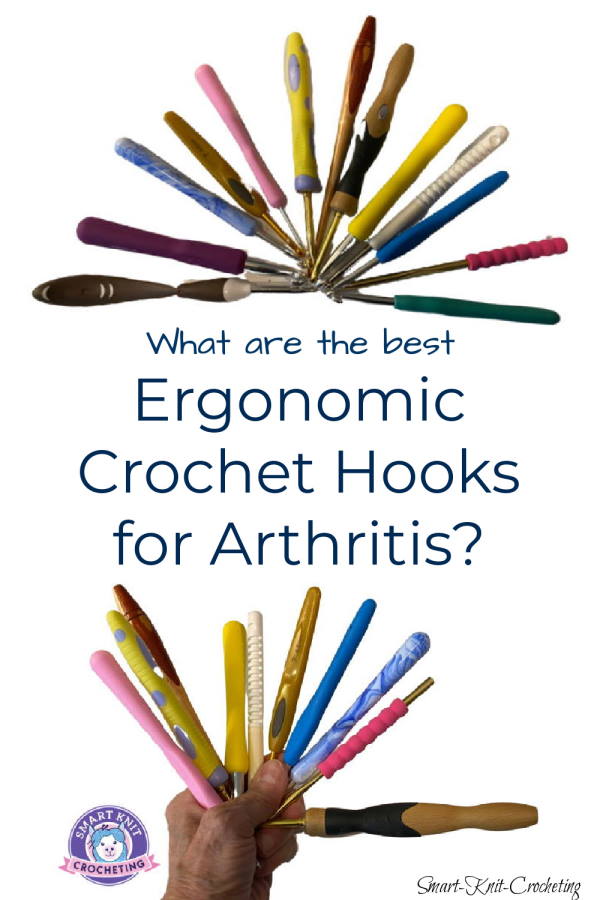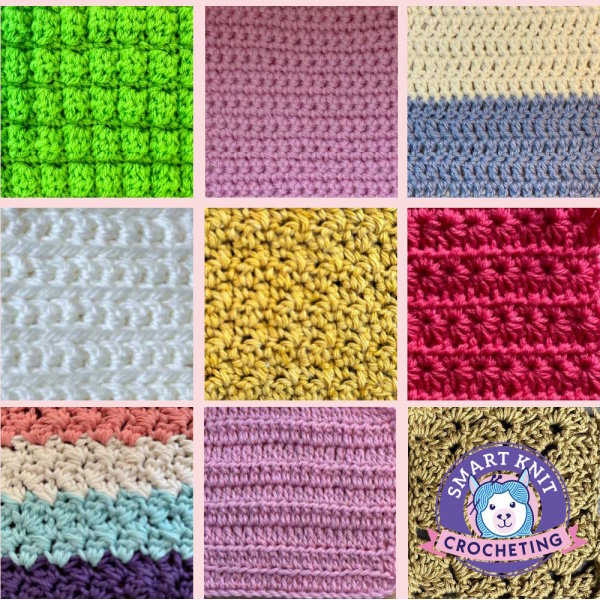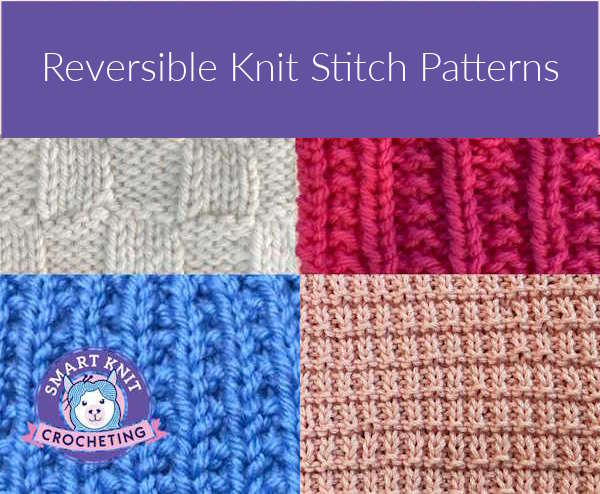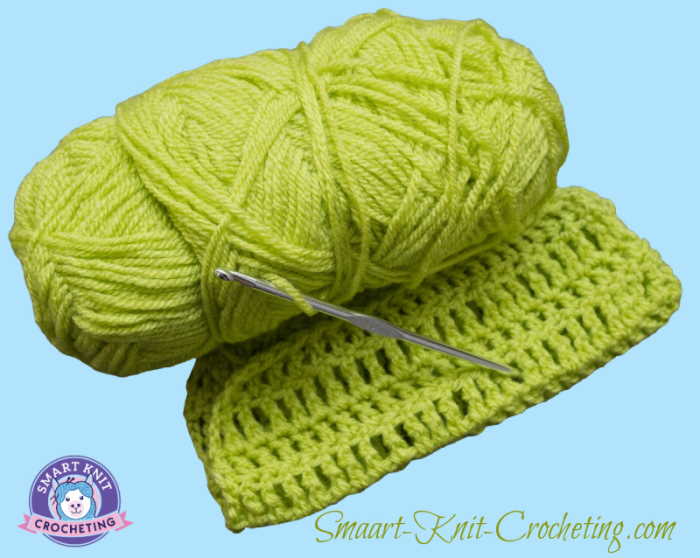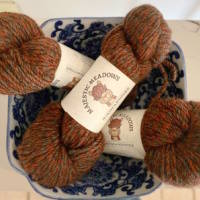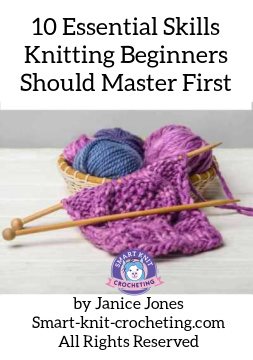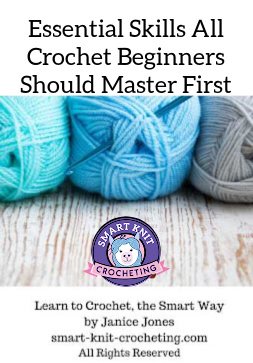- Home
- Crochet Assessories and Tools
- Best Ergonomic Crochet Hooks
Best Ergonomic Crochet Hooks for Arthritis
Best Ergonomic Crochet Hooks by Janice Jones
If you are feeling some pain or soreness in your hands, you might wonder if your days as a crocheter are quickly coming to an end. If you're like me, a diagnosis of osteoarthritis or rheumatoid arthritis may seem like a death sentence for an avid crochet lover.
But the good news is that it's not, and your hands get extra exercise when you crochet, and that may be good for you.
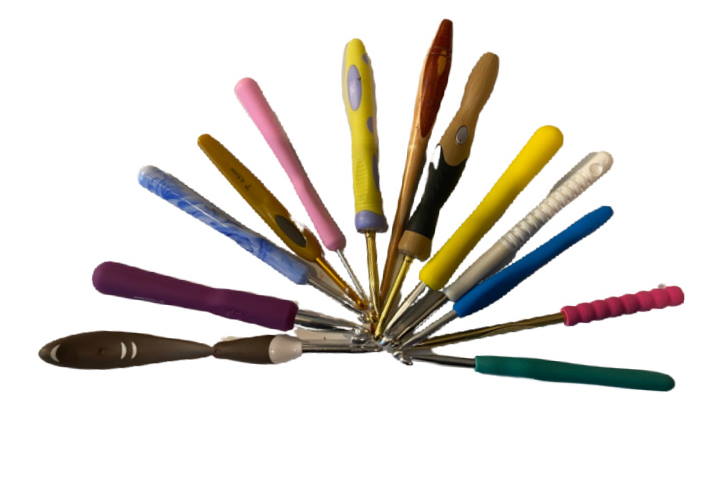
By now, you're probably saying, but if it is painful, do I really want to crochet? In this article, I will argue that crocheting can be fun and fulfilling for everyone, including those dealing with joint pain. The act of crocheting may also act as a sort of occupational therapy for sore hands.
But we must take additional steps to keep our hands in good shape and pain-free and prevent any repetitive strain injury.
Regardless of your diagnosis, joint pain can be uncomfortable and quite painful, so crocheting may exacerbate the situation, especially if you like to crochet for long periods of time.
Disclaimer: This article is for educational purposes only and does not replace medical advice. Always consult a healthcare professional regarding arthritis or chronic pain.
Who Should Use Ergonomic Crochet Hooks?
- Crocheters with arthritis or joint pain
- Anyone experiencing wrist, thumb, or hand fatigue
- Beginners learning proper grip habits
- Long-session crocheters (blankets, garments, gifts) or for those who crochet for a living.
How Arthritis Affects Crocheting — and What Helps
According to experts, there is no reason why we can't knit or crochet, even if we have arthritis if we follow a few simple rules.
- Soak your hands in warm water before beginning and stretch to reduce stiffness
- Vary your crafts, switch from crocheting to knitting, to needlepoint or other needlecrafts
- Loosen your grip. If you find yourself gripping the hook, practice crocheting with a looser grip.
- Allow yourself plenty of time to complete your projects so you don't feel rushed.
- Rest and take plenty of breaks
- Use an ergonomic crochet hook.
Personal Choices for Crocheting After a Diagnosis of Arthritis
If I may, I'd also like to add to the list above, based on my own personal experience.
- Try a different hook (inline or tapered)
- Find the perfect ergonomic crochet hook
- Crochet when you are relaxed
- Crochet in a warm area where your hands will not get cold
- Remember to hydrate while you work
- Stretch your hands and fingers
Arthritis can significantly impact the hands, drastically reducing mobility and causing substantial pain.
The fingertips, knuckles, and the base of the thumb are common sites affected by arthritis, leading to swelling, stiffness, and difficulty performing tasks that require grip strength, dexterity, or fine motor control, such as crocheting.
Not only does arthritis cause pain, but it may also lead to muscle weakness and a reduced range of motion, making it difficult to grip and maneuver a traditional crochet hook for prolonged periods.
Luckily we have a few tools today to help keep us happily crocheting longer than our mothers could years ago. We can count on ergonomic crochet hooks designed for hands that might need a little help.
A quick search turns up the definition of ergonomics: Ergonomic products help us become more productive, healthy, and efficient.
There are ergonomic products everywhere: chairs, shoes, keyboards, and even pillows, and there is no reason we can't have ergonomic crochet hooks.
What is an Ergonomic Crochet Hook?
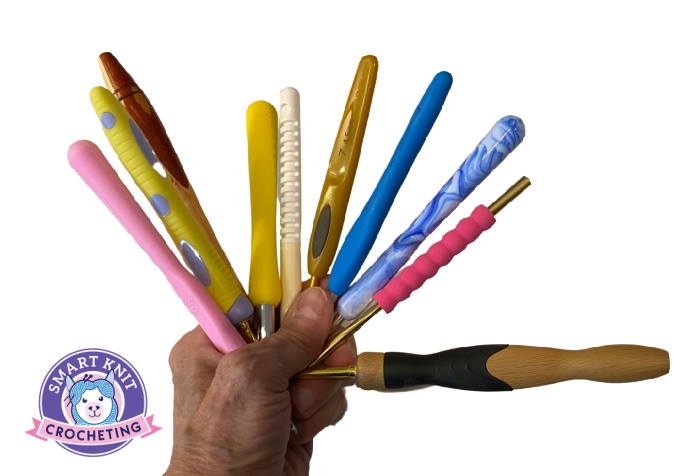
Ergonomic crochet hooks offer design elements specifically catered to the challenges experienced by people with hand pain.
They typically come with larger, padded handles that can be easier to grip, reducing the strain on arthritic joints and the force needed to hold the hook. This can significantly increase comfort and ease of use for people with arthritis.
The handle materials are also soft and warm, reducing cramping and stiffness associated with cold and inflexible crochet hooks.
The longer handles of the hooks further distribute the pressure evenly across the hand, lowering the incidence of pain during and after use.
An ergonomic crochet hook may also have specific allowances for different grip styles - pencil or knife, which postures distribute the strain more evenly, adding another layer of comfort.
The bottom line is that they can make crocheting a more enjoyable and comfortable hobby for individuals with arthritis.
Unfortunately, no one hook is best for everyone. Much depends on how you hold your hook (pencil or knife hold), the type of crochet you do, the size of your hands, and the length of time you devote to this hobby.
We all have different styles of crocheting, and no two hands are ever the same, so no ergonomic hook shape is the perfect solution.
In general, ergonomic crochet hooks are designed to reduce the fatigue you might experience when crocheting for a long time and prevent pain in the hands, fingers, and wrists.
Learn more about crochet hooks by reading this beginner's tutorial.
Does The Way You Hold Your Hook Matter?
Holding your crochet hook correctly is the first step to reducing strain on your joints. There are two popular methods — the pencil grip and the knife grip.
For the pencil grip, imagine holding your crochet hook as if it were a pencil. The hook rests on your middle finger while the thumb and index finger hold it.
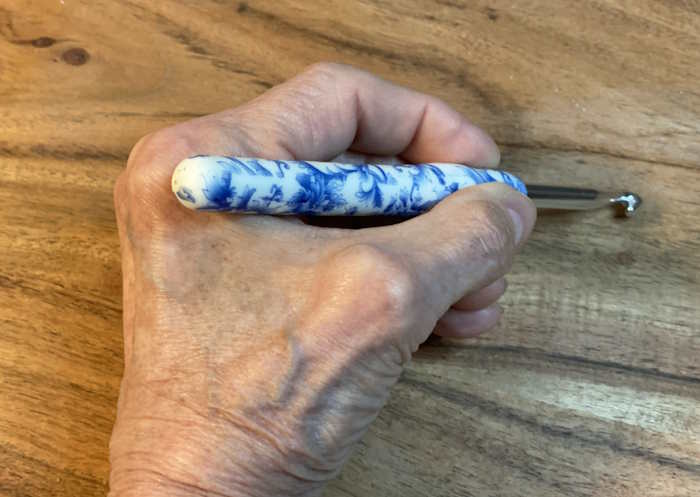 This is me with severe arthritis holding a crochet hook using a pencil grip
This is me with severe arthritis holding a crochet hook using a pencil gripIn contrast, the knife grip involves holding the hook like a dinner knife, with the handle resting on your palm and your fingers wrapped around it.
Both grip styles have their advantages and can help reduce strain on your joints, depending on your comfort level.
Regardless of the grip you use, an important thing to remember is to keep it relaxed.
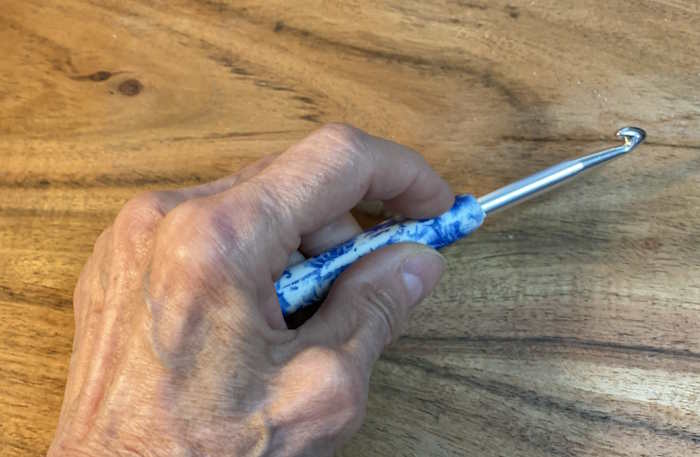 I'm holding the crochet hook using a knife grip. Notice the swollen joints due to RA.
I'm holding the crochet hook using a knife grip. Notice the swollen joints due to RA.A tight grip could lead to muscle strain and discomfort, potentially exacerbating arthritis symptoms.
Regularly take breaks to rest your hand, and do gentle hand and wrist stretches to maintain flexibility. If you still experience discomfort, consider using an ergonomic crochet hook designed specifically to minimize strain and be easy on your joints.
Ergonomic Crochet Hooks for Right and Left Handed Crocheters
Ergonomic crochet hooks are produced to be suitable for both right-handed and left-handed crocheters. They are designed with a symmetrical handle to meet the unique needs of different individuals irrespective of the dominant hand, making them comfortable for everyone to use.
However, the specific comforts might vary by individual, so it's essential for each crocheter to test various brands and designs to determine the perfect fit for their crocheting style and hand orientation.
Weight of Crochet Hooks
The weight of the crochet hook can significantly impact comfort when crocheting, particularly for those dealing with arthritis. Lightweight hooks put less strain on arthritic hands and wrists, making it easier to crochet for longer periods without discomfort or fatigue.
While heavier crochet hooks may have other ergonomic benefits such as wider, easier-to-grip handles, they can sometimes exacerbate wrist or hand pain, particularly during lengthy periods of crocheting. This is because they require more effort and strength to manipulate, which can strain sore, stiff or swollen joints.
Many ergonomic crochet hooks are designed to be lightweight yet sturdy, balancing the need for less strain with the practicality of efficient crochet work. This said the best hook weight can vary significantly among individuals.
Some people might prefer a slightly heavier hook as it can feel more substantial and controlled in their hand, while others will find a super lightweight hook to be most comfortable.
Types of Crochet Hook Shapes
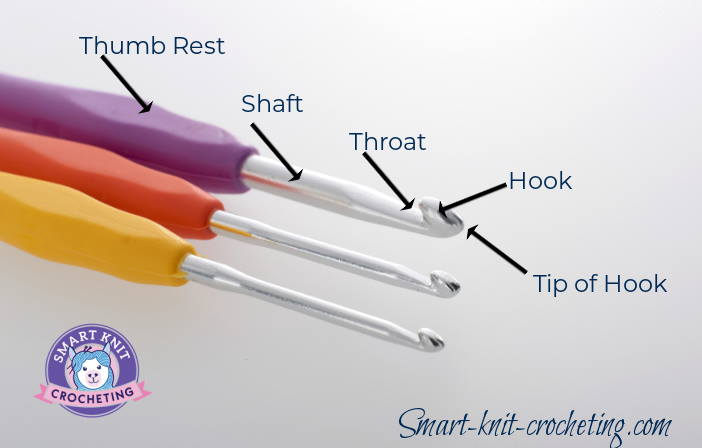
Before I review my favorite ergonomic hooks, I think it's essential to look at the different kinds of hooks: Inline crochet hooks and tapered hooks.
Inline Crochet Hooks
These hooks are shaped to have straight edges that stay straight to the tip of the hook. The hook is carved into the shaft of the crochet hook, making the head directly in line with the shaft. The head of the hook may be sharper or pointed, and the groove may be deeper. The hook is in line with the handle of the crochet hook.
Inline hooks can be good for allowing it to be inserted into tight stitches because they have a point at the top, but they can also snag or split the yarn.

An example of an inline crochet hook with a deeper throat, pointed head, and a shaft that is inline with the head.
Tapered Crochet Hooks
As opposed to the inline crochet hook that is straight, the tapered hooks have a narrowing as the shaft nears the throat of the hook and a rounded tip.
This narrowing gives the tapered hook a shallower throat, which some beginners find difficult to work with. The tapered hook generally has a rounded hook head, as well.
These hooks are likely better if you have wrist pain because they require less movement to get the loops of yarn on and off the hook.

A tapered crochet hook has a narrowing of the shaft as it nears the throat and has a rounded head.
Materials Used to Make Hooks
Traditional Crochet Hooks are made from wood or bamboo, steel or aluminum, resin, and plastic. Even the thin metal hooks can be turned into an ergonomic hook with the addition of soft rubber handles.
If you love a specific hook, you will likely find an ergonomic hook made of the same material. If you are an experienced crocheter you've no doubt worked with different crochet hooks and discovered their likes and dislikes.
Unfortunately, beginners may need to experiment with different ones to find the perfect hook that's right for them. If you are new to crochet, before purchasing a complete set of hooks and a carry case, consider experimenting with different hooks to see how they feel.
Check for:
- Ease of Use: Not only how it feels but how it performs with different types of yarn
- Is the Thumb Rest comfortable?
- Does it have a comfortable handle for your hand?
- Does the hook you love come in a wide range of sizes?
- Is the hook you love within your price range?
How to Choose the Best Ergonomic Crochet Hook for You
- Choose handle thickness based on hand size
- Test pencil vs knife grip compatibility
- Look for clearly labeled sizes
- Balance weight vs control
- Start with one hook before buying a complete set
Top Choices for the Best Ergonomic Crochet Hooks: Buyer's Guide
Here are My Top Picks for Crocheters Who Have Arthritis, Carpal Tunnel Syndrome, or any hand or wrist pain. I have used them all and can say these are my favorite, best ergonomic crochet hooks for arthritis.
Clover Amour Crochet Hooks and Clover Amour Crochet Hook Set
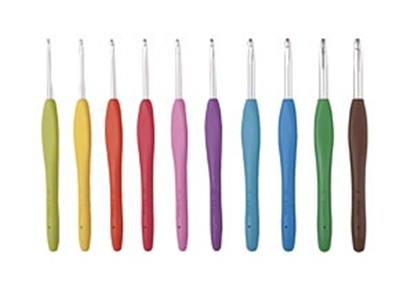
One of my favorites is the Clover Amour Crochet Hooks. It is made with an elastomer handle that is warm and easy to grip for extended periods. The thickness of the grip is just about right, and these hooks are affordable.
Each size comes in a different colored handle, and the hooks are tapered and primarily aluminum, but larger sizes are made of plastic. I think aluminum hooks are good because they don't snag your yarn.
You will find them in sizes B (2.25mm) – P/Q. The length is a generous 5 7/8 inch long, and the larger sizes K to PQ are over 6 inches long.
I love the colors, and after using them for a while, I can identify the size simply by the color. But if I forget, the sizes are imprinted on the handles and are easy to read.
Check out Clover Amour Crochet Hooks and Clover Amour Crochet Hook Set on Amazon
Tulip Etimo Crochet Hooks and Tulip Etimo Rose Crochet Hooks
These hooks are made from high-quality aluminum and coated with a polished finish that won't chip. The ergonomic handles have a soft comfort that is comfortable in your hands. Sets come in sizes D3 (3.25 mm) to J10 (6 mm).
If you love pink and need larger-sized hooks, they also come as a set, Tulip Etimo Rose Crochet Hook Set, that includes three crochet hooks in sizes 8/0, 9/0, and 10.5/0, one tapestry needle, one ruler, and one case.
Check the price on Tulip Etimo Crochet Hooks on Amazon
Boye Ergonomic Crochet Hooks
From a company that has been around since 1906, Boye makes these Ergonomic Crochet Hooks that you can purchase individually or as a set. The set includes 12 hooks, B (2.25), C (2.75mm), D (3.125), E (3.5mm), F (3.75), G (4.25), H (5mm), I (5.25mm), J (5.75mm), K (6.5mm), L (8 mm), and N (10mm).
Each Boye hook in this crocheting supply set features an ergonomic handle with a soft rubber grip.
Yarniss Crochet Hooks
This is an excellent choice for a beginner because it is likely the most economical kit I've reviewed. The hooks have a non-slip, color-coded ergonomic elastomer handle with an aluminum hook.
The smooth tapered hooks are longer than most, which makes them ideal if you need to add additional loops onto the hook.
The complete set includes hook sizes B (2.0mm) through N (10.0mm), and the sizes are printed on the handles for easy identification. The kit consists of 9 yarn needles, ten stitch markers, a pair of scissors, and a fabric case.
They also sell a set of smaller ergonomic hooks in sizes (0.8mm /1.0mm / 1.25mm / 1.5mm / 1.75mm / 2.0 mm / 2.25mm / 2.5mm / 2.75mm), with sizes marked on the handle. These are for those interested in lace and doily crocheting.
Check the price of these Yarniss crochet hooks on Amazon
BeCraftee Crochet Hooks Kit
Here is another inexpensive set of 12 Extra-Long Crocheting Needles with Soft, Ergonomic Rubber Grips in just about any size you might need to get started if you are starting with crochet.
Every crochet hook is a different color and has printed letters and numbers on the handle, so you'll always know which needle is which. I definitely do not recommend purchasing a hook or set of hooks that are not labeled.
Their kit consists of 12 hooks from B/1 (2.0mm) to L/11 (8mm). You can also purchase a kit containing 9 hooks from B/1 (2.0 mm) to J/10 (6.0 mm), 6 yarn needles, 10 stitch markers, 2 stitch holders, scissors, measuring tape, a ruler, and a row counter.
Learn more about the BeCraftee Crochet Hooks Kits on Amazon
Furls
These are likely the most beautiful hooks you will find. They are handmade, sourced from sustainably harvested woods, and crafted to have a smooth surface, but the wood's grains show through naturally. Their larger handles make them ergonomically friendly, and crocheting with them will not add to painful hands or wrists.
They are available in sizes D (3.25mm) to P (10.0mm) and are 7 inches long. Furls hooks are a generous 7 inches long, which may be too long for some, but I appreciate those extra inches and love the wood feel in my hands.
They source different woods, including teak, ebony, and camwood. Others are made from resin, polished aluminum, and a combination of a nickel-plated tip with a cosmetic-grade resin handle. The biggest drawback, in my opinion, is that these hooks are more costly than others.
Furls Ergonomic Hook in size 4.5 mm. Check price on Amazon.
Addi Swing Crochet Hook
We probably all know Addi for their knitting machines and wide assortment of knitting needles, but it surprised me that they also make Crochet hooks, and ones with an unusual shape at this.
They are ergonomic have just a hint of flexibility, which means they fit right into the curve of the hand to allow for a more comfortable crocheting.
They are available individually in a full range of sizes and also be found in small sets. Each size has it's own color and the sizes are marked clearly on the soft handle.
Susan Bates
This company also produces
ergonomic hooks as part of its line. You've no doubt purchased Susan Bates
products if you are familiar with crafting, and this company also makes crochet
accessories. You can buy them individually or as a crochet set, which is
economical.
Susan Bates' ergonomic hooks are designed for comfort with gently rounded tips and a long taper to make crocheting easier, especially when you have more than one loop on the hook, and reduce yarn splitting.
They are made of ultra-smooth aluminum and come in sizes E to K. Some crochet enthusiasts like how the hooks pick up stitches, but the colors fade or bleed onto your fingers. Something to consider if you are using a light-colored yarn.
Comparison Table: Best Ergonomic Crochet Hooks Reviewed
| Brand | Handle Type | Weight | Hook Style | Best For | Notes |
|---|---|---|---|---|---|
| Clover Amour | Soft rubber (elastomer) | Light | Tapered | Arthritis, beginners, long sessions | Color-coded sizes, smooth aluminum hook |
| Tulip Etimo | Cushioned soft grip | Medium | Tapered | Precision work, relaxed grip | Polished aluminum, excellent control |
| Boye Ergonomic | Soft rubber grip | Light | Tapered | Budget-friendly ergonomic option | Widely available, familiar feel |
| Yarniss | Non-slip rubber handle | Light | Tapered | Beginners, value sets | Includes accessories, clearly labeled sizes |
| BeCraftee | Extra-long rubber grip | Light | Tapered | New crocheters, kits | Great starter set, labeled hooks |
| Furls | Solid ergonomic (wood/resin) | Heavier | Inline-style head | Hand stability, knife grip | Premium price, beautiful craftsmanship |
| Addi Swing | Angled ergonomic handle | Light–Medium | Tapered | Wrist pain, carpal tunnel | Unique bend supports natural hand angle |
| Susan Bates Ergonomic | Comfort grip | Light | Inline | Tight stitches, inline lovers | Strong stitch control, color transfer possible |
Frequently Asked Questions
What is the best ergonomic crochet hook for arthritis?
What is the best ergonomic crochet hook for arthritis?
The best ergonomic crochet hook for arthritis is one with a soft grip and a larger, cushioned handle that reduces strain on the hands.
Brands like Clover Amour, Furls, and Tulip Etimo are highly rated for people with arthritis. These hooks are designed to improve comfort, promote natural hand positioning, and help reduce pain during extended crocheting sessions.
Are ergonomic crochet hooks better?
Are ergonomic crochet hooks better?
Yes, ergonomic crochet hooks are generally better for comfort and long-term use — especially for those who crochet frequently or have hand issues.
Their design reduces hand fatigue by supporting a relaxed grip and providing a more natural alignment of the wrist and fingers.
Many crocheters report they can crochet longer without discomfort when using ergonomic hooks.What crochet hooks are most comfortable to use?
What is the easiest crochet hook to use for beginners?
What is the easiest crochet hook to use for beginners?
For beginners, the easiest crochet hook to use is typically an ergonomic hook with a soft grip and medium size to large size — usually 5.0 mm (H/8) and larger. Steer clear of delicate steel needles used to make doilies with crochet thread.
Can ergonomic crochet hooks help with hand pain?
Can ergonomic crochet hooks help with hand pain?
Yes, ergonomic crochet hooks are specifically designed to help reduce hand pain and tension. By providing better grip support and reducing the force needed to hold the hook, they can help prevent or alleviate symptoms of carpal tunnel syndrome, arthritis, or general hand fatigue. Using ergonomic tools is one of the most effective ways to crochet more comfortably and safely.
Best Ergonomic Crochet Hooks for Arthritis: Last Words
Just because you have arthritis or another type of injury does not mean you should give up crocheting. There are hooks that were specifically designed to minimize pain and discomfort making crocheting an enjoyable pastime again.
Find the best hook for you by experimenting with different brands. If you already know that you like tapered or inline hooks, seek out ergonomic hooks that meet those requirements.
Once you have found your ideal hook, consider investing in a kit that includes all the major sizes you normally use in your work.
Keep crocheting. The exercise you get will be good for you. (at least that is what my rheumatologist told me!)
